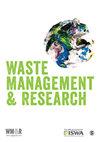初级食品行业没有浪费
IF 3.7
4区 环境科学与生态学
Q3 ENGINEERING, ENVIRONMENTAL
引用次数: 0
摘要
欧洲联盟(欧盟)循环经济行动计划的目标是到 2030 年将回收材料的使用量翻一番。我们认为,以废物为中心的资源利用方式可能会对这一目标产生不利影响。这项工作的目的是在爱沙尼亚、拉脱维亚、立陶宛和挪威等文化背景相同、气候相似的国家,找出限制或促进初级食品行业废物利用的因素。来自初级食品生产部门的生物质质量上乘,非常适合利用,但如果被视为废物,其利用可能会受到限制。在众多可能影响生物质价值的管理决策触发点中,我们重点关注技术和政策。我们的半结构式访谈涉及废物或副产品的分析和管理,并探讨了允许生物质增值的废弃物处理和替代机制。然而,访谈显示,没有一家公司认为任何东西都是废物,而是原材料或生产剩余物。公司根本不承认任何假设的障碍。这似乎是资源利用的一个很好的例子,但这种方法很随意,可能与官方的理解和废物报告要求相冲突。欧盟对废物的定义是相同的,任意处理可能会产生误导。有必要对材料流进行更好的管理,以确保生物质的有效循环,避免其成为废物。我们建议通过引入环境、社会、治理和自我控制系统来解决这一问题。本文章由计算机程序翻译,如有差异,请以英文原文为准。
No such thing as waste in primary food sector
The European Union (EU) circular economy action plan aims to double its use of recycled material by 2030. We argue that waste-centric approach to resources may have adverse consequences to this ambition. The aim of the work was to find out the factors limiting or promoting the use of waste from primary food sector in countries with the same cultural background and similar climate in Estonia, Latvia, Lithuania and Norway. Biomass from the primary food production sector is of good quality and excellent to use, but its use may be limited if given waste status. From numerous management decision trigger clusters, which may affect valorisation of the biomass, we focus on technology and policy. Our semi-structured interviews addressed the analysis and management of waste or by-products and explored the end-of-waste and alternative mechanisms that allowed the biomass to be valorised. However, the interviews revealed that none of the companies regard anything becoming waste, but as raw material or production left-over. Any obstacles hypothesised turned out not to be acknowledged by companies at all. This appears to be a very good example of the use of resources, but the approach is haphazard and may conflict with official understanding and waste reporting requirements. Definition of waste is the same in the EU, and arbitrary treatment can be misleading. There is a need for better management of the material flow to ensure effective biomass circulation avoiding its becoming waste. We recommend that this be addressed by introducing environmental, social, governance and a self-control system.
求助全文
通过发布文献求助,成功后即可免费获取论文全文。
去求助
来源期刊

Waste Management & Research
环境科学-工程:环境
CiteScore
8.50
自引率
7.70%
发文量
232
审稿时长
4.1 months
期刊介绍:
Waste Management & Research (WM&R) publishes peer-reviewed articles relating to both the theory and practice of waste management and research. Published on behalf of the International Solid Waste Association (ISWA) topics include: wastes (focus on solids), processes and technologies, management systems and tools, and policy and regulatory frameworks, sustainable waste management designs, operations, policies or practices.
 求助内容:
求助内容: 应助结果提醒方式:
应助结果提醒方式:


